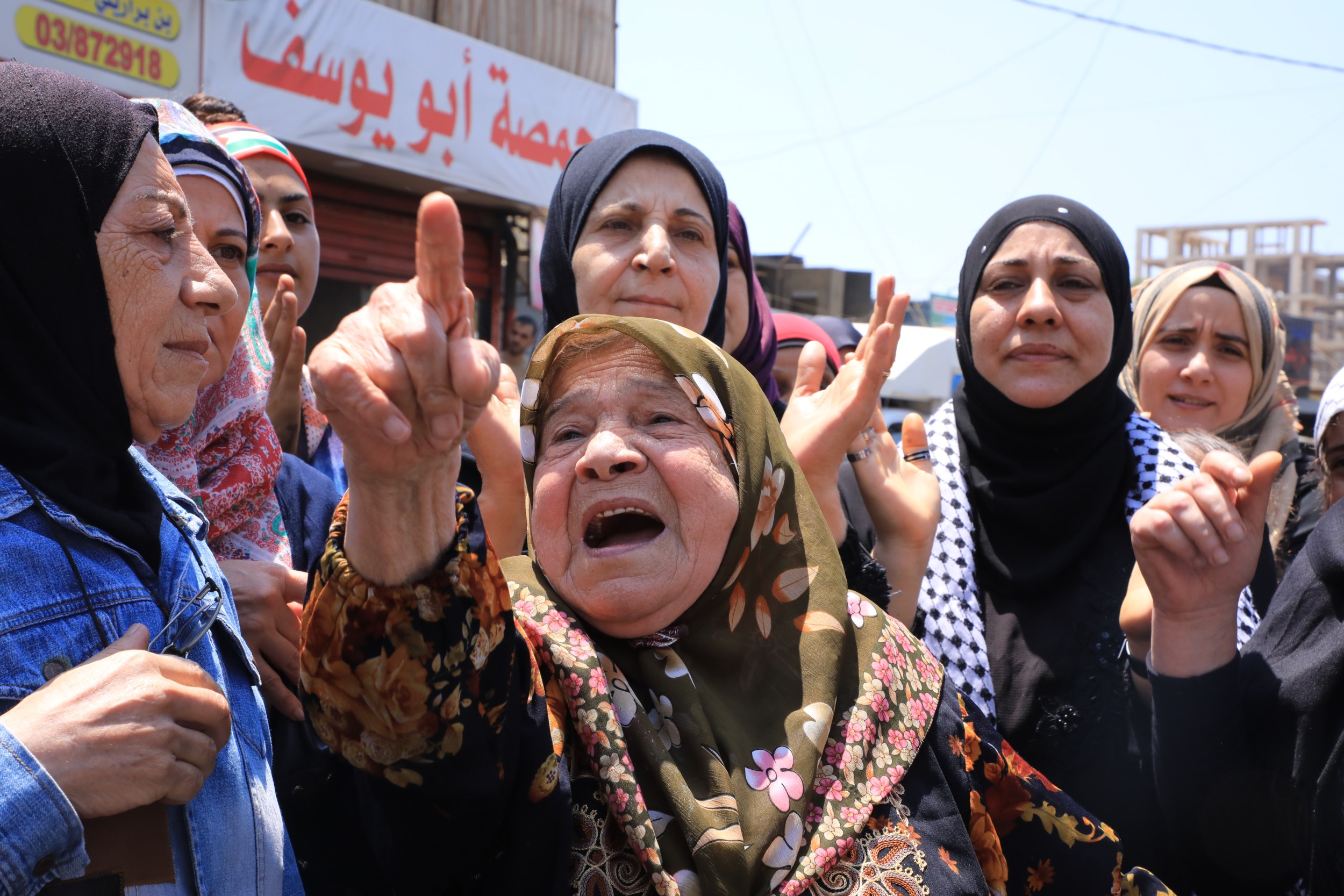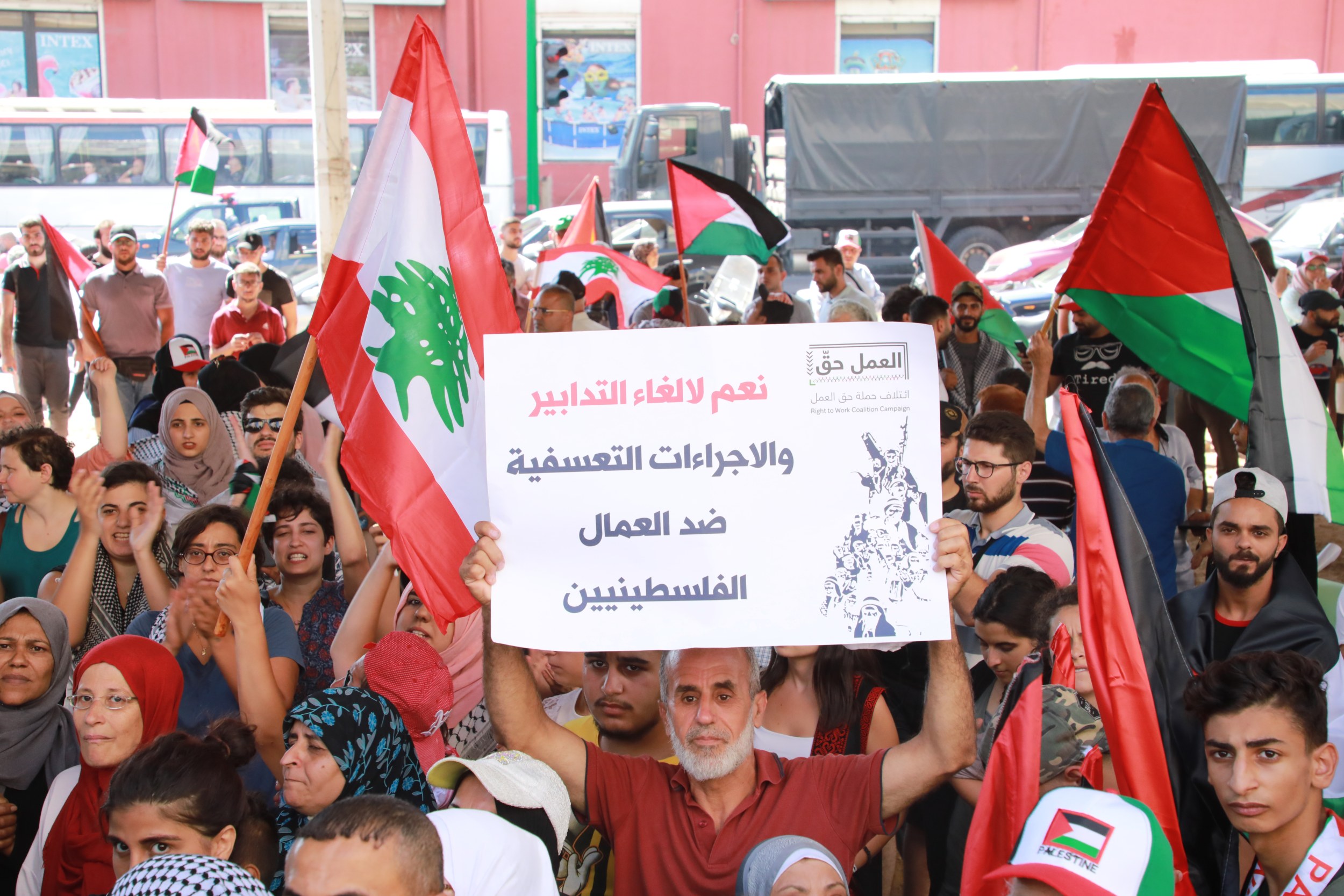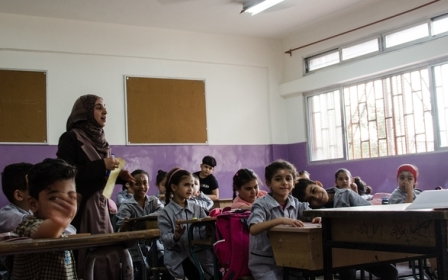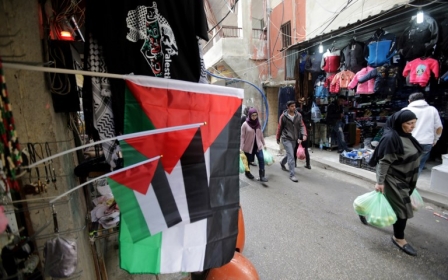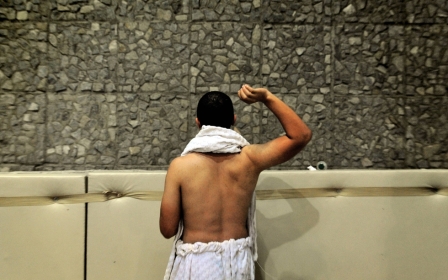Palestinian refugees in Lebanon denounce new 'inhumane' work restrictions
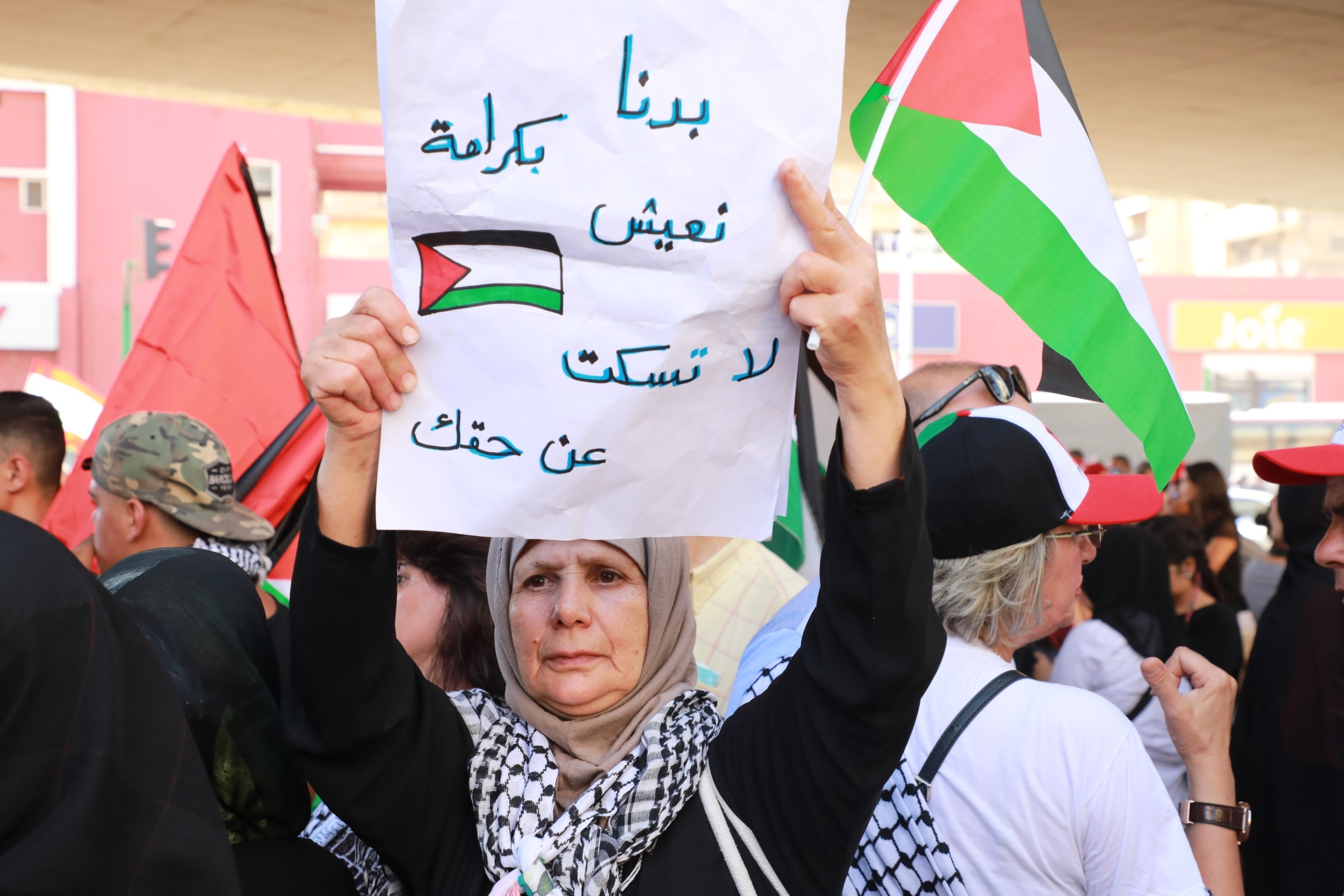
Palestinian flags flew in the wind, as Palestinians raised banners reading “Do not be silent about your rights” amid chants against the US "deal of the century" and calls for the implementation of the right of return for refugees on Friday.
The demonstrations, however, were not in the occupied Palestinian territories, but in Lebanon.
Friday marked a day of anger in all 12 Palestinian refugee camps across Lebanon, with thousands of demonstrators marching in the capital Beirut to denounce recent moves by Lebanese Minister of Labour Camille Abu Sleiman to declare a war on “illegal foreign labour”.
In early June, Abu Sleiman - who is backed by the Lebanese Forces, a party with a long history of anti-Palestinian positions - gave business owners one month to obtain work permits for any non-Lebanese working illegally in the country.
Immediately after the expiry of this deadline, a series of inspections across the country led to the closure of dozens of businesses.
New MEE newsletter: Jerusalem Dispatch
Sign up to get the latest insights and analysis on Israel-Palestine, alongside Turkey Unpacked and other MEE newsletters
Included in this legislation are Palestinian refugees, despite their presence in Lebanon since 1948, when thousands fled their homes in historic Palestine during the establishment of the state of Israel, in what is known as the Nakba - or “catastrophe”.
According to the United Nations Relief and Works Agency (UNRWA), some 450,000 Palestinian refugees lived in Lebanon as of 2014 - making up an estimated 10 percent of the country’s population.
However a more recent census by the Lebanese Central Bureau of Statistics and the Palestinian Central Bureau of Statistics in 2017 put the figure at a much lower 174,000, indicating many had left the country.
Despite their long history in Lebanon, the community has struggled for decades under social and state discrimination; and many fear the latest moves will only make their situation more precarious.
Longstanding discrimination
Mohammad Ali, a Palestinian refugee from Ain el-Helweh refugee camp in southern Lebanon, has not missed a day of demonstrations since 15 July.
“It is the right time to voice our concern for our rights. We want nothing but dignity,” he told Middle East Eye. “Preventing us from all civil rights, including the right to work, is inhumane.”
“The law is not clear when it comes to us,” the 27-year-old explained.
He gave the example of his father Kamal, who owns a small legal business outside Ain el-Helweh.
“The Lebanese inspectors gave my father a one-month notice to get working permits for the Palestinians working for him. In order to get the permit, he must pay to register them for social security - but the funny part is that they will not be allowed to benefit from social security!”
Indeed, for the past 72 years Lebanese laws and regulations have failed to address the civil status of Palestinians.
The lack of clear status for Palestinians is in large part due to longstanding sectarian tensions in the country, with Christian political parties long opposing steps to integrate the majority Sunni Muslim Palestinian community in Lebanese society, fearing that doing so would upend the sectarian balance of power.
As a result, depending on the legislation, Palestinians can be treated as refugees, foreigners, or stateless persons. A number of laws notably prevent Palestinians from owning property or attending public school, and they are also affected by legislation preventing Lebanese mothers from passing on citizenship to their children.
Since 2005, Lebanese law also prohibits Palestinian refugees from working in 70 professions - including medicine, engineering, teaching and even fishing or driving a taxi.
Samah Salim, a resident of the Bourj el-Barajneh refugee camp south of Beirut, has a degree in pharmacy.
'You cannot lock us in a refugee camp, deprive us of all means of life and then say we are bad'
- Saber Halimeh, Palestinian refugee from Bourj al-Barajneh
While she obtained good results on her exams, she is not allowed to work or have her own pharmacy outside the borders of the refugee camp.
“All my classmates now have pharmacies of their own or work for big, well-known pharmacies,” Salim told MEE. “It feels like I have wasted my time and money trying to seek this degree.”
Saber Halimeh is also a resident of Bourj el-Barajneh. While the journalist is half-Lebanese, he says he is discriminated against by both the Lebanese government and citizens.
“I am half Lebanese, but when it comes to civil rights, I am a full Palestinian in the eyes of the Lebanese government,” he told MEE.
“Some Lebanese perceive us as a danger. This is not true, we are not a danger to anyone on any level,” he explained. “But you cannot lock us in a refugee camp, deprive us of all means of life and then say we are bad.
“More than 60 percent of us in the camps live below the poverty line. Sometimes it feels they are setting up conditions and situations to make us look bad.”
For Halimeh, existing restrictions, including on construction in the derelict refugee camps, have meant that the latest move by the Ministry of Labour is seen as the straw that broke the camel’s back for many refugees.
“Every month, we have ceilings falling on people’s heads. They go through a whole lot of suffering just to let in some building materials to fix the roof on top of their heads,” he said.
“When people die, we need a permit to bring in cement and concrete for the grave - and they ask why we are protesting.”
Palestinian parties rally behind the movement
The Lebanese government’s latest crackdown on undocumented workers and its effect on Palestinian refugees has therefore triggered a strong response from a community already struggling with high levels of poverty.
In addition to daily protests in several camps across the country, since 15 July Palestinians in Ain el-Helweh have called for a public boycott of Lebanese goods.
Store owners have stopped buying Lebanese goods, leaving their shop shelves completely bare. Meanwhile, fellow refugees in other refugee camps, like Rashidiyeh near the city of Sur, have begun a fundraising campaign to send produce made by Palestinian farmers to Ain al-Helweh.
Palestinian political factions have meanwhile stepped in to support the protest movement - with representatives from several political parties meeting regularly since the beginning of the crisis at the Palestinian Authority embassy in Beirut.
“We are going to continue with peaceful actions in the refugee camps until the Lebanese Ministry of Labour treats the Palestinian refugees in a fair and just way,” read a statement coming out of one of these meetings.
“We Palestinians did not choose to live in Lebanon,” Usama Hamdan, a Hamas leader in Lebanon, told MEE. “We have nowhere else to go. We are staying in these refugee camps until the implementation of our right to return to Palestine," he said, referring to UN General Assembly Resolution 194 on the right of return for refugees.
“The demonstrations held by the refugees have been civilised and we could not achieve any political gains if they were not accompanied by a popular Palestinian movement,” Hamdan added.
'We Palestinians did not choose to live in Lebanon. We have nowhere else to go'
- Usama Hamdan, Hamas leader in Lebanon
Hamdan also revealed that they were expecting some “positive results” in the near future during planned meetings between Palestinian and Lebanese officials, and that he was sure that the Palestinians would respect the outcome of these meetings.
Meanwhile, Samir Abu Afash, Fatah party treasurer in Lebanon, insisted on the need for an in-depth Lebanese-Palestinian dialogue.
“Palestinians in Lebanon need to know their duties and their rights,” he told MEE. “The Lebanese government issued Palestinians their IDs and their travel documents. This is enough to say that we are not outsiders.”
For Abu Afash, the latest crackdown on Palestinian workers was part of an internal Lebanese race over votes.
“The Free Patriotic Movement [of President Michel Aoun] started a campaign against Syrian refugees in Lebanon a few months ago, and this increased its popularity. I think the Lebanese Forces are doing the same but against Palestinians to increase their popularity,” he said.
Internal Lebanese divisions
The response of Lebanese Forces to the ongoing Palestinian demonstrations appeared to corroborate Abu Afash’s view.
Sajaan Qazzi, a former Lebanese minister of labour and former leader of the Lebanese Forces, said the measures to register undocumented workers had been initially put forward three years ago, back when he was minister, but were only now implemented by Abu Sleiman.
Qazzi told MEE he was extremely worried by the current Palestinian movement in reaction to the new legislation.
“I am afraid that this might be leading us to a new civil war between the Lebanese and the Palestinians,” he said. “The Palestinians’ actions surprised me! They are not justified whatsoever. I believe someone is behind all these movements.”
Qazzi accused Hamas of being behind the protests, and claimed it was a consequence of the power struggle between Gaza-based Hamas and the Fatah-led Palestinian Authority in the West Bank - despite multiple Palestinian parties coming out in support of the movement.
For the Lebanese political figure, the ongoing political conflict between Fatah and Hamas in the occupied Palestinian territories affected the validity of Palestinians’ demands in Lebanon.
“This conflict has cast its shadow on the camps here. It’s a war between Palestinians,” he claimed.
'The Palestinians’ actions surprised me! They are not justified whatsoever'
- Sajaan Qazzi, former Lebanese minister of Labor
Qazzi also pointed to the Lebanese government’s long-standing inability to provide basic services - such as 24/7 electricity and clean water - to its citizens as further justifying depriving Palestinians of their rights.
“How is the [Lebanese] government supposed to give Palestinians their rights, when it is not able to fulfill the needs of its own people?” he asked.
The former minister defended the decision to restrict Palestinian employment, saying he was wary of the possibility that granting more rights to Palestinian refugees in Lebanon would lead them to permanently settle in the country, eventually become Lebanese citizens and take over power.
“What would stop the process of resettling Palestinians in Lebanon?” he said.
“We are worried that this might actually happen. As a Christian Maronite, I am worried that if the Palestinians are resettled, then we Christians would become a minority. There is a demographic balance that we should maintain here in Lebanon.
“A Palestinian cannot own a Kalashnikov and ask to be employed as an accountant at the same time,” Qazzi added.
In spite of Qazzi’s claims, ongoing demonstrations have been peaceful, and Palestinian refugees have not taken up arms against Lebanese since the 2007 Nahr al-Bared conflict between the Lebanese army and the Fatah al-Islam group.
Not all Lebanese political figures agree with the views of the right-wing Christian parties.
Parliament Speaker Nabih Berri, who heads the Shia Muslim Amal party, has denounced Abu Sleiman’s measures, asking the minister to call them off.
Meanwhile, the general director of Lebanon’s General Security intelligence agency, Abbas Ibrahim, declared on 17 July that Palestinians would no longer be treated as foreigners in airports and could now, after seven decades in the country, stand in lines reserved for Lebanese citizens.
These efforts have been seen as an attempt to alleviate some pressure on Palestinians and show the goodwill of the Lebanese government.
Meanwhile, Palestinian refugees vow to continue their protests and boycott of Lebanese businesses - even as the Muslim holiday of Eid al-Adha, a time traditionally celebrated with new clothes and sweets, is fast approaching.
Suha Ahmad, a young mother of two, believes now is the time to secure a moderately better future for her children.
“I am not going to buy my kids Eid clothes,” she said. “I know this might break their hearts, but when they grow up, they will understand why I did this.”
Nonetheless, she hoped that “by the time Eid comes, we all celebrate it like every year - Palestinians and the Lebanese, like one big family”.
Middle East Eye delivers independent and unrivalled coverage and analysis of the Middle East, North Africa and beyond. To learn more about republishing this content and the associated fees, please fill out this form. More about MEE can be found here.


